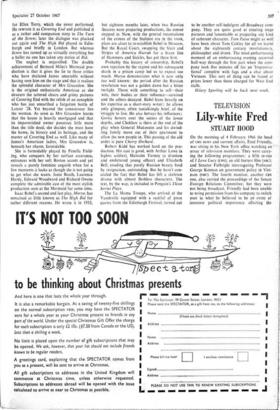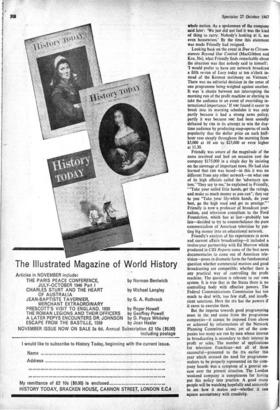Lily-white Fred
TELEVISION STUART HOOD
On the morning of 4 February 1966 the head of CBS news and current affairs, F,red Friendly, was sitting in his New York office watching an '. • array of television monitors. They were carry- ing the following programmes: a fifth re-run of I Love Lucy (cBs); an old feature film (ABC); and Senator Fulbright interrogating Professor George Kennan on government policy in Viet- nam (Nw). The fourth monitor, another CBS one, also carried the proceedings of the Senate Foreign Relations Committee; but they were not being broadcast. Friendly had been unable to wring permission from his company to switch over to what he believed to be an event of immense political importance affecting the
whole nation. As a spokesman of the company said later: 'We just did not feel it was the kind of thing to carry. Nobody's looking at it, not even housewives.' By the time this statement was made Friendly had resigned.
Looking back on the event in Due to Circum- stances Beyond Our Control (MacGibbon and Kee, 36s), what Friendly finds remarkable about the situation was that nobody said to himself : 'I would prefer to have our network broadcast a fifth re-run of Lucy today at ten o'clock in- stead of the Kennan testimony on Vietnam.' There was no editorial decision in the sense of one programme being weighed against another. It was 'a choice between not interrupting the morning run of the profit machine or electing to take the audience to an event of overriding in- ternational importance.' If NBC found it easier to break into its morning schedules it was only partly because it had a strong news policy; partly it was because NBC had been soundly defeated by CBS in its attempt to win the day- time audience by producing soap-operas of such popularity that the dollar price on each half- hour rose steeply throughout the morning from $5,000 at 10 am to $25,000 or even higher at 11.30.
Friendly was aware of the magnitude of the sums involved and had on occasion cost the company $175,000 in a single day by insisting on the coverage of important news. He had also learned that °is was based—in this it was no different from any other network—on what one of its high officials called the 'adversary sys- tem.' 'They say to me,' he explained to Friendly, "'Take your soiled little hands, get the ratings, and make as much money as you can"; they say to you "Take your lily-white hands, do your best, go the high road and get us prestige."' Friendly is now a professor of broadcast jour- nalism, and television consultant to the Ford Foundation, which has at last—probably too late—decided to try to counterbalance the pure commercialism of American television by put- ting big money into an educational network.
Friendly's analysis of his experiences in news and current affairs broadcasting—it included a twelve-year partnership with Ed Murrow which produced in CBS Reports some of the best news documentaries to come out of American tele- vision—poses in dramatic form the fundamental question whether commercial motives and good broadcasting are compatible; whether there is any practical way of controlling the profit machine. The question is relevant to our own system. It is true that in the States there is no controlling body with effective powers. The Federal Communications Commission has too much to deal with, too few staff, and insuffi- cient sanctions. Here the ITA has the powers if it cares to exercise them.
But the impetus towards good programming must in the end come from the programme companies—it cannot be imposed from above or achieved by reformations of the Network Planning Committee alone; yet of the com- panies too many are run by men whose interest in broadcasting is secondary to their interest in profit or sales. The number of applications for television franchises—not all of them successful—presented to the ITA earlier this year which stressed the need for programme- makers to be properly represented on the com- pany boards was a symptom of a general un- ease over the present situation. The London weekend company is conspicuous for having put this policy into practice. A good many people will be watching hopefully and anxiously to see how it makes out—whether it can square accountancy with creativity.











































 Previous page
Previous page